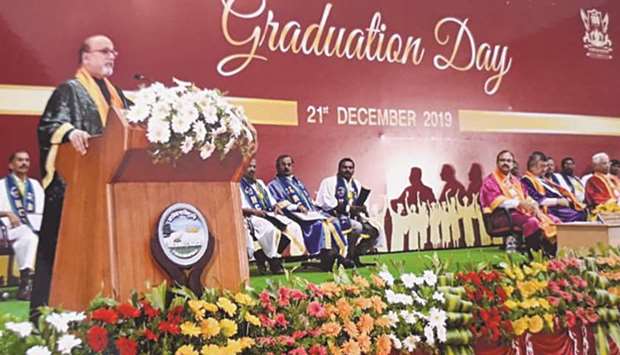Doha Bank CEO Dr R Seetharaman was the chief guest at the centenary celebration and the convocation of National College, Trichy, in India’s Tamil Nadu state.
Speaking at the convocation, Seetharaman said, “The founders of National College conceived the idea of a national institution to promote among its youth the highest and the loftiest ideals which constitute the essence of Indian culture. True to its name, National College continues to impart cultural values and fulfil its role as one of the premiere nation-building institutions of the country.
“The college has a vision to offer quality higher education to the younger generations, especially from rural India, who are economically and socially backward, to liberate themselves from prejudice, oppression and ignorance and to gain knowledge for their bright future. It ignites the young minds with lofty ideals and inspire them to achieve excellence in the chosen field.
“It facilitates individual growth of students, with accent on character building, through co-curricular and extra-curricular activities. It encourages the students to take-up research and help them reach global. It provides a congenial atmosphere to study and learn, with infrastructural facilities of highest order.”
On sustainable development, he said, “The current realignment of global architecture will support the achievement of one of the Sustainable development goals. Economies need to integrate the principles of sustainable development into their policies and programs and reverse loss of environmental resources.
“This will also enable such economies to achieve the UN sustainable development goal of ensuring environmental sustainability.”
He gave insight on happiness at work place and said, “Today Youth spend substantive time at work place. A happy environment would motivate them to bring positive changes and improve productivity both in organisations and society at large. Human happiness has large and positive causal effects on productivity. Positive emotions appear to invigorate (gives strength or energy) human beings. The driving force seems to be that happier workers use the time they have more effectively, increasing the pace at which they can work without sacrificing quality.
“Happiness isn’t something leaders impose or force on employees as a top-down program or engagement strategy to squeeze more productivity out of them. It’s a mindset that begins with leaders shifting their own beliefs and accepting employees as their greatest asset. When human beings at work are held with the utmost regard, you begin to treat them differently. This shift can happen only by creating an environment that will attract and retain a culture of high performers who feel valued, respected, and encouraged.”

Dr R Seetharaman speaking at the centenary celebration and the convocation of National College in Trichy.
